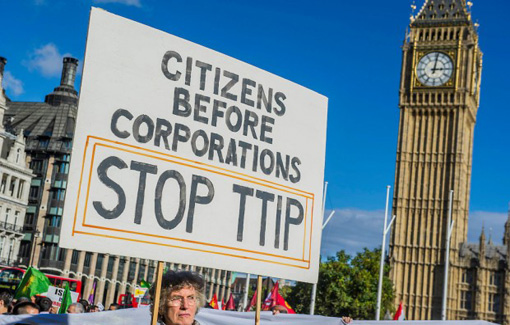
On May 2, the environmental organization Greenpeace leaked the 12th draft of the Transatlantic Trade and Investment Partnership (TTIP), a trade deal between the U.S. and the E.U. which is ostensibly meant to lower barriers to international trade but which calls into question issues of nation-state sovereignty and corporate supremacy on the world stage. The document has been in negotiations since 2013 and resistance to it has been fierce, primarily in the E.U. With the leak, anti-TTIP organizations are newly invigorated while those in favor of the deal may be beginning to crack under pressure.
The 248-page document breaks down into 16 chapters covering topics such as agriculture, electronic communications, and sanitary and phytosanitary measures. While U.S. and E.U. officials are negotiating the document, over 90% of their advisors represent corporate interests. Critics say the document has confirmed the suspicions of environmental watchdogs, labor unions, and progressive political parties in Europe: that the TTIP constitutes little more than a corporate power grab similar to the one embedded in the agreement being negotiated between the U.S. and Pacific rim countries, called the Trans-Pacific Partnership.
Like with the TPP, the TTIP has faced harsh criticism from left and right wing groups in the affected countries. On the right, the deal is seen primarily as selling out national sovereignty and giving jobs that belong to fellow countrymen to foreigners. For the left, it’s about the declining labor standards and threat to public services that often come along with liberalization.
A corporate power grab
The critics from right and left have at least one concrete shared concern. The “investor-state provisions” which allow corporations to sue nation states because of perceived lost profits remains a major structural problem for both. According to the watchdog group, U.S. taxpayers have already been forced to pay more than $440 million to multi-national corporations because of similar provisions in previous trade agreements (with $34 billion in pending corporate claims).
One example of such a case unfolded in 1997. Canada’s parliament banned the import of a gasoline additive called MMT due to the public health risks and was subsequently sued by the additive’s manufacturer, Ethyl Corporation citing NAFTA. Ethyl Corporation called it “expropriation” and claimed damages of over $200 million. The parties settled for $15 million in damages and the repeal of the law that banned MMT.
This is just one case in dozens of these supra-national corporate courts disciplining the decisions of democratically elected governments in the name of profit.
Race to the bottom
Greenpeace released its analysis of the leaks along with the raw documents. It highlighted some of the implications for the struggle for environmental preservation.
For example, in the agriculture chapter [Office1] “the E.U. wants agreement to state that nothing will restrain the Parties from taking measures necessary to achieve… protection of public health, safety, environment, public morals and even cultural diversity.” However, the U.S. calls such requests “trade distorting” and have set a goal of undermining the E.U. GMO regulatory process.
Public Citizen released a document calling TTIP “Monsanto’s Plan B,” naming and shaming many U.S. corporations want “to force the E.U. to roll back its precautionary stance toward GMO approvals” and undermine the member-state’s right to ban GMOs altogether (which 9 E.U. countries have).
Even more vexing is the lack of consideration given to climate protections. Despite the COP 21 climate conference in Paris last year, a read-through of the documents revealed no reference to the historic meeting of nations. With corporations like Chevron heavily lobbying the negotiators, this could be a troubling signal that the TTIP’s authors are getting ready to attempt an end-run around agreed-upon standards for keeping global warming under 2 degrees Celsius.
Growing opposition
It’s not just activists who are concerned about the TTIP any more. The conflict between the TTIP’s two sides on the issues of climate and environment has driven the already skeptical French President Francois Hollande to the breaking point. Shortly after the leak of the TTIP documents, President Hollande said that France “will never accept questioning essential principles for our agriculture” and that, at this stage of negotiation, he would reject the deal. Without France, a U.S.-E.U deal is unlikely to succeed.
Popular resistance to the TTIP continues to grow in countries where elected officials remain in favor of a deal. Polling taken after the leak by Infratest Dimap, a research firm in Germany, shows that “70 percent of Germans said the Transatlantic Trade and Investment Partnership deal would bring ‘mostly disadvantages,’ up from 55 percent in a similar poll in June 2014.” The German people are not limiting their expression of disapproval to negative responses to polling questions. In April, 90,000 of them turned out in protest the week of a visit from President Barack Obama to city of Hanover.
Even though German Chancellor Angela Merkel has said she remains determined to do “everything to conclude the negotiations,” her government’s frustration with U.S. negotiators is growing. Christian Schmidt, Germany’s Federal Minister of Food and Agriculture told The Independent that the U.S. has “hardly made any serious concessions.”
“We won’t sacrifice our high food safety standards in a barter trade for approval of European car blinkers,” Schmidt said.
For British Prime Minister David Cameron, the days since the leaks have been spent attempting to put out fires of worry among his constituents about possible threats to the National Health Service, their national healthcare program. The worry comes after it was shown that Britain did not include explicit guarantees safeguarding the public nature of the NHS, while countries like Austria, Germany, and Italy did include such guarantees for their healthcare systems.
Cameron dismissed such concerns during questions from the Parliament, calling them “the reddest of red herrings,” adding his opinion that “there are plenty of reasons that people don’t want to see trade expanded, I think we should be honest… rather than using the red herring of the NHS to distract from a trade deal that could add tens of billions to our economy and generate jobs.”
The Independent spoke to Mark Dearn from the anti-poverty organization War on Want who told them, “the only slippery fish here is the prime minister, whose rhetoric flies in the face of two sets of legal opinion stating that the NHS is in danger. As well as this, the E.U.’s published TTIP offer clearly shows the NHS is up for grabs.”
In the U.S., protests against the TTIP have been few in number compared to the all-out offensive against the Trans-Pacific Partnership. The largest labor federation in the United States, the AFL-CIO has the fight against “fast track” trade authority which would mandate, pending completion, both TTP and TTIP to receive an up-or-down vote in Congress without the possibility of amendment while Some of its leaders have gone as far to vow to block PAC funds to Democratic candidates for office who support secretive trade deals.
Despite their efforts, the Congress passed fast track in June of 2015.
No fans of secret trade deals in general, officials at the AFL-CIO have said that they are “trying to influence what is in” the TTIP but no official communiqués have been released in light of the leaks.
Despite the fast track set back, things look good for the anti-free trade forces in the U.S. on either side of the electoral coin.
Despite initial support for the Trans-Pacific Partnership and the Bill Clinton-signed North American Free Trade Agreement, pressure from Vermont Senator and presidential candidate Bernie Sanders has pushed Democratic presidential front-runner Hillary Clinton to come out against both.
Meanwhile, Republican presumptive nominee Donald Trump has vanquished his 16 other competitors for the nod partly by campaigning hard in the Rust Belt against the havoc NAFTA has wreaked in working class communities.
Continued vigilance will likely be needed to safeguard the working families of the world from more corporate power grabs such as the TTIP.
Photo: TTIP protest in London. | Popular Resistance












Comments